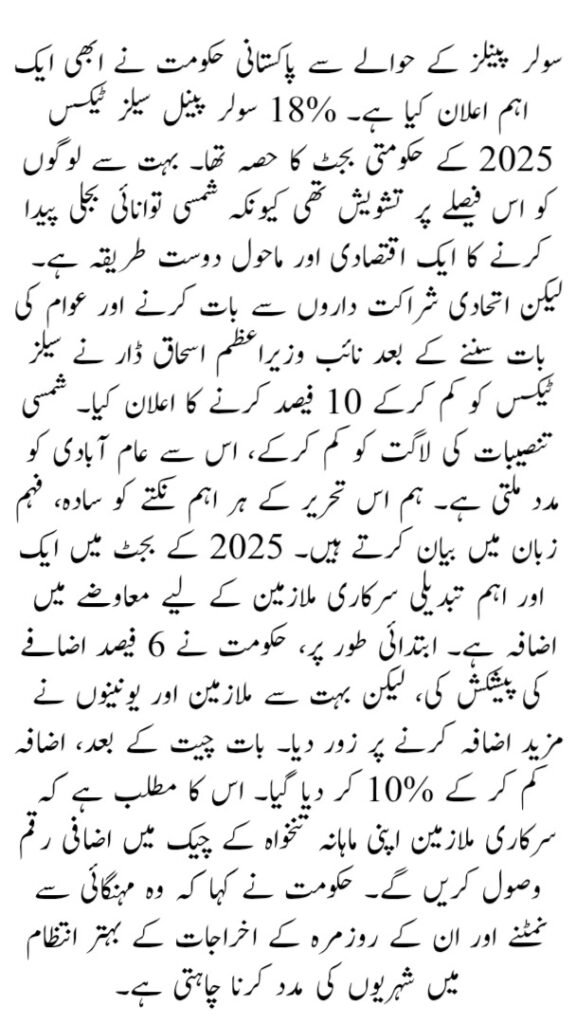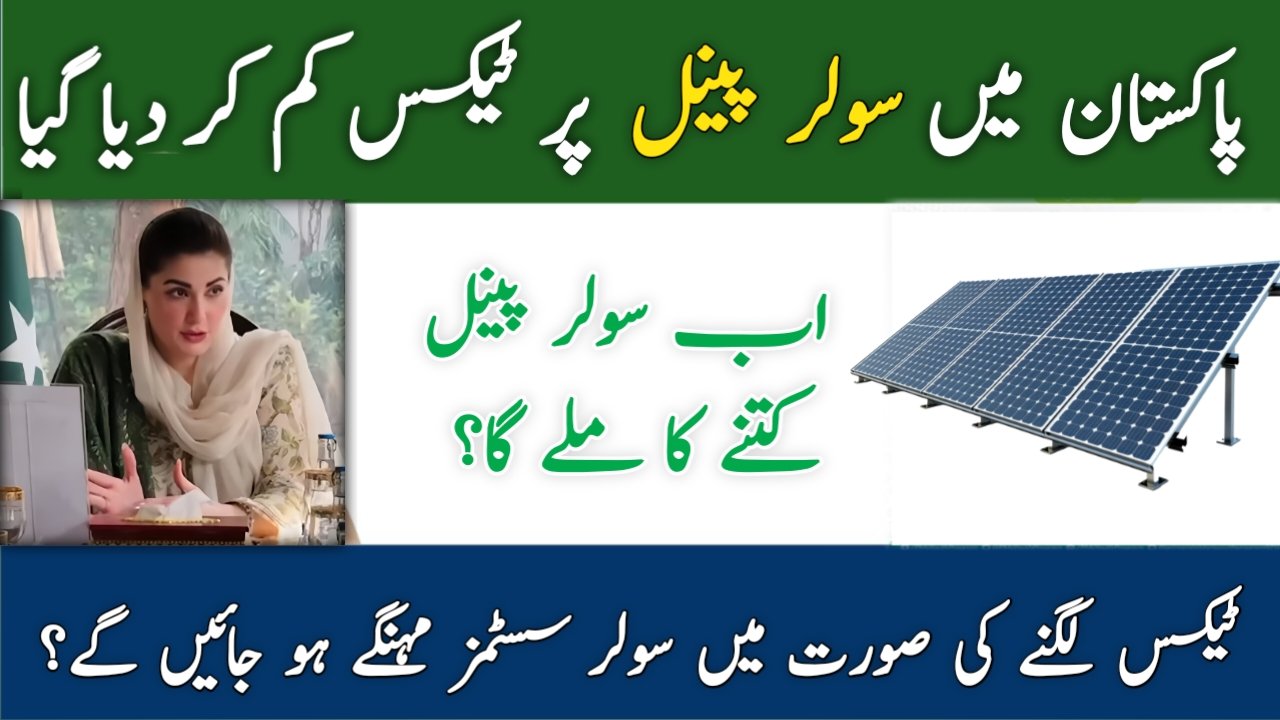Regarding solar panels, the Pakistani government just made a significant announcement. An 18% solar panel sales tax was part of the 2025 government budget. Many individuals were concerned about this decision because solar energy is an economical and environmentally friendly way to generate electricity. But after talking with coalition partners and hearing from the public, Deputy Prime Minister Ishaq Dar announced that the sales tax would be lowered to 10%. By lowering the cost of solar installations, this helps the general population. We cover every significant point in this piece in simple, intelligible language.
| Topic | New Update |
| Sales Tax on Solar Panels | Reduced from 18% to 10% |
| Government Salary Increase | Raised from 6% to 10% |
| Sindh University Budget | Increased to PKR 4.7 billion |
| Project Management Shift | Given to Federal Company (PIDCL) |
Sales Tax on Solar Panels Reduced to 10%
- The government first planned to apply 18% tax on solar panels.
- This would have made solar systems more expensive for many people.
- After public concerns and meetings with coalition partners, the plan was changed.
- Now, the sales tax is reduced to 10%.
- Deputy Prime Minister Ishaq Dar said the decision was made through mutual understanding.
- The goal is to support clean energy and make solar power more affordable.
- This step will help more families install solar systems and save on electricity bills.
Benefit for Government Employees: Salary Increased
Another significant change in the 2025 budget is a compensation rise for government personnel. Initially, the government offered a 6% hike, but many employees and unions pushed for more. Following talks, the increase was reduced to 10%. This means that government employees will receive extra money in their monthly paycheck. The government stated that it wishes to assist citizens in dealing with inflation and better managing their everyday expenses.

See also: Punjab Rozgar Scheme
Budget Increase for Sindh Universities
- The Sindh government was concerned about the education development budget.
- The original budget for Sindh’s universities was PKR 2.6 billion.
- After discussions, the budget was maximized to PKR 4.7 billion.
- This extra payment will help universities improve their buildings and facilities.
- They can also hire better teachers and staff.
- More scholarships can be offered to students.
- The government said that education is a top priority.
- All provinces should receive fair and equal support for their educational needs.
All New Projects Now Handled by Federal Company After the
Public Works Department (PWD) was disbanded, its projects were transferred to provincial governments. However, Sindh had some issues with this change. The Prime Minister has now determined that all new development projects would be managed by Pakistan Infrastructure Development Company Limited (PIDCL). This federal firm will oversee projects in all provinces. It is supposed to make project management more organized and efficient.
See also: BISP 8171 Biometric Issue Resolved
Positive Step Toward Clean and Affordable Energy
- Reducing tax on solar panels is a smart move for a cleaner environment.
- Solar energy is good for the planet and helps people save money.
- The tax cut from 18% to 10% encourages more people to use solar power.
- It can help reduce pressure on the national power grid.
- This change may also help solve electricity shortage problems in the country.
- Many people now feel more motivated to install solar systems at homes and businesses.
Cooperation and National Unity Highlighted
Deputy Prime Minister Ishaq Dar’s speech focused on political party unity. He stated that all budget amendments were made with the cooperation of coalition partners. The emphasis is on overcoming difficulties via communication and collaboration. The administration wishes to create economic stability, decrease public stress, and foster teamwork for Pakistan’s prosperity. This demonstrates that judgments are not made alone, but rather with the cooperation of all people concerned.
Conclusion
In this post, we will go over all of the specifics concerning the government’s recent decision to lower sales tax on solar panels, as well as other key updates. The tax is now only 10%, making solar energy more affordable for all. Salaries for government personnel are being increased, institutions in Sindh are receiving more funding, and development projects will be administered more efficiently. This demonstrates the government’s commitment to progress, unity, and support for the people of Pakistan.
FAQs
Q1: Will the reduced tax on solar panels apply to all brands and types?
Yes, the 10% tax applies to all types and brands of solar panels available in the market.
Q2: Can this tax rate change again in the future?
Yes, tax policies can change in future budgets depending on the country’s economic condition.
Q3: How will this decision affect the prices of complete solar systems?
With lower tax, the overall price of solar systems (including batteries and inverters) will also come down.
Q4: Is there any government subsidy or scheme for installing solar panels?
At this time, no official subsidy has been announced, but some provinces may offer support programs separately.

